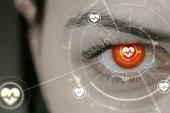AI-Enhanced ECG Shows Potential for COVID-19 Screening
The approach might be of use in the emergency department, but not for large-scale screening of the public, one expert says.

Taking advantage of subtle changes caused by acute SARS-CoV-2 infection, artificial intelligence (AI)-enhanced ECG may prove useful as a way to screen for—and exclude—COVID-19, a study suggests.
In an initial test group, in which about one-third of patients had tested positive for the virus, the AI algorithm excluded acute infection with a negative predictive value (NPV) of 90.5%. When additional ECGs were brought into the sample to reduce the actual COVID-19 prevalence to about 5%, to better reflect a real-world scenario, the NPV topped 99%.
“We can fairly highly accurately rule out the presence of infection in a subject using the 12-lead electrocardiogram,” said Suraj Kapa, MD, one of the lead authors of the study along with Zachi Attia, PhD (both Mayo Clinic, Rochester, MN).
As they write in a paper published online in Mayo Clinic Proceedings, “this may permit the development of ECG-based tools to rapidly screen individuals for pandemic control especially in a clinic or hospital setting. Development of mobile technology enabled AI-ECGs may have broader implications that may enable resumption of normal operations across society.”
Salah Al-Zaiti, PhD, RN (University of Pittsburgh, PA), who was not involved in the study, said the most likely potential application for the technology would be as gatekeeper to further evaluation for COVID-19 in the emergency department or clinic when patients come in showing signs of infection. Because of the high NPV with the approach, if it indicates the absence of infection then a PCR test—which comes with exposure risks for healthcare workers obtaining test samples, costs, and a wait for results—would not be needed.
“So, in other words, rather than doing the PCR test for everyone who walks into the emergency room, you might end up doing it maybe to 50% who walk through the ED because the ECG-AI would filter a lot of people,” Al-Zaiti commented to TCTMD. “We would call that cost reduction and better resource utilization.”
Both Kapa and Al-Zaiti stressed, however, that further prospective studies are required before AI-enhanced ECG can be introduced into routine practice as a screening tool for COVID-19.
Picking Up Signs of Infection on the ECG
As the COVID-19 pandemic was escalating in early 2020, concerns about a myocarditis-like syndrome began to grow. Over the last few decades, researchers have used various coronaviruses to create animal models of myocarditis, with some studies showing that acute coronavirus infections can cause detectable changes on the ECG. The research group at the Mayo Clinic has been exploring the use of AI-enhanced ECG to detect various CV conditions, such as atrial fibrillation and LV dysfunction, and they decided to look into whether a similar approach could be used to detect acute SARS-CoV-2 infection, Kapa said.
“Given the periodic shortages of reagents for current coronavirus genetic screening tests, delays in obtaining results, as well as associated costs, a low-cost, readily scalable solution for rapid point-of-care screening is critical for pandemic management,” the investigators write.
The study was done within the international Discover Consortium, a group of researchers from 28 sites in 14 countries who came together quickly to evaluate digital and noninvasive screening for COVID-19 using AI-assisted ECG. With some assistance from industry, the consortium collected ECGs recorded in patients with PCR-confirmed COVID-19 and in age- and sex-matched controls without COVID-19. They trained a convolutional neural network using 26,153 ECGs, validated the algorithm in another set of 3,826 ECGs, and tested it in an additional 7,870 ECGs; in all cases, roughly one-third of patients had COVID-19.
In the test group, the AUC for detection of acute COVID-19 was 0.77, with a sensitivity of 98%, specificity of 10%, and NPV of 90.5%.
The researchers then added 50,905 control ECGs to bring the COVID-19 prevalence down to about 5%. In this analysis, the AUC was 0.78, with a sensitivity of 98%, specificity of 12%, and NPV of 99.2%.
If the findings are validated in prospective studies, it may allow for the use of AI-enhanced ECG as a way to screen for and exclude acute SARS-CoV-2 infection, the investigators say. “Through identifying those at low risk of active infection, it can further help in identifying those patients in whom a genetic or antigen-based COVID-19 test may be useful, independent of symptoms, and thus serve as an integral part of a cascaded testing regimen,” they write. “This proof of concept, retrospective analysis demonstrates biologic plausibility, in support of prospective studies.”
‘Impressive Work’
Al-Zaiti had some quibbles regarding the methods the investigators used to select the comparison groups in the study and the suggestions of broader population screening for COVID-19 using the AI-ECG technique, but he called the effort impressive. Generally, he said, AI applications end up with a “black box” that masks the inner workings of the algorithm. In contrast, the electrophysiology underlying the ECG is well known.
This study, Al-Zaiti said, “is one of the excellent examples that demonstrate how you can combine both, the black-box paradox of deep learning and AI and well-established scientific knowledge, to come up with something meaningful. . . . We never have a perfect diagnostic test. But in their work, they have made something that is as close as it could be to real clinical implications. It has promise and has clinical potential, and it needs to be used in the right context with the right type of patients.”
Because AI-enhanced ECG would be used to influence decision-making, it would have to go through regulatory approval before clinical introduction, Al-Zaiti said. If that happens, the cost of implementing the approach would be minimal if the algorithm is open source, he indicated, noting that Medicare reimbursement for performing and interpreting a 12-lead ECG is $10. “An ECG-AI would be a fraction of that $10, we’re talking about cents, compared to a PCR test.”
Indeed, Kapa said, the idea is that this AI algorithm would be made available to everybody at no cost. “We saw this as a mission-driven interest to help society in a way that could improve outcomes in a situation [in which] really everybody needed to get together and help,” he added.
Further research is still needed to show that the AI-enhanced ECG approach works, especially in outpatient settings, Kapa said, noting that the ECGs used in this study mostly came from patients who were hospitalized. It also remains to be seen whether this algorithm is specific for SARS-CoV-2 or whether similar results would be seen for other types of infection, like influenza.
In addition, there is potential for this type of approach to be implemented using consumer devices that measure single- or six-lead ECGs, like smartwatches, which would open up this up to much of the general population. “Our vision was that if we’re able to do this reliably, it becomes eminently more scalable than swabs, both in terms of real-time assessment as well as being something that theoretically an individual can do on their own, at home, in a supermarket, or when walking into a crowded event,” Kapa said. The results of this study suggest that might be feasible, but it remains to be proven.
For now, it’s clear that the ECG is a powerful tool that might provide insights into disease processes beyond the heart, Kapa said.
In addition, the effort behind creation of the AI-enhanced ECG algorithm—and the speed with which it came together—highlight the opportunities that now exist for global innovation and collaboration, Kapa said. “I think that’s very telling as to what’s possible in the digital age.”
Todd Neale is the Associate News Editor for TCTMD and a Senior Medical Journalist. He got his start in journalism at …
Read Full BioSources
Attia ZI, Kapa S, Dugan J, et al. Rapid exclusion of COVID infection with the artificial intelligence ECG. Mayo Clin Proc. 2021;Epub ahead of print.
Disclosures
- The study received no financial support from industry, but General Electric, SHL, Philips, and Epiphany Healthcare donated resources, expertise, and in some cases, equipment to aggregate ECG data into a central research server for analysis.
- Attia, Kapa, and Al-Zaiti report no relevant conflicts of interest.





Comments